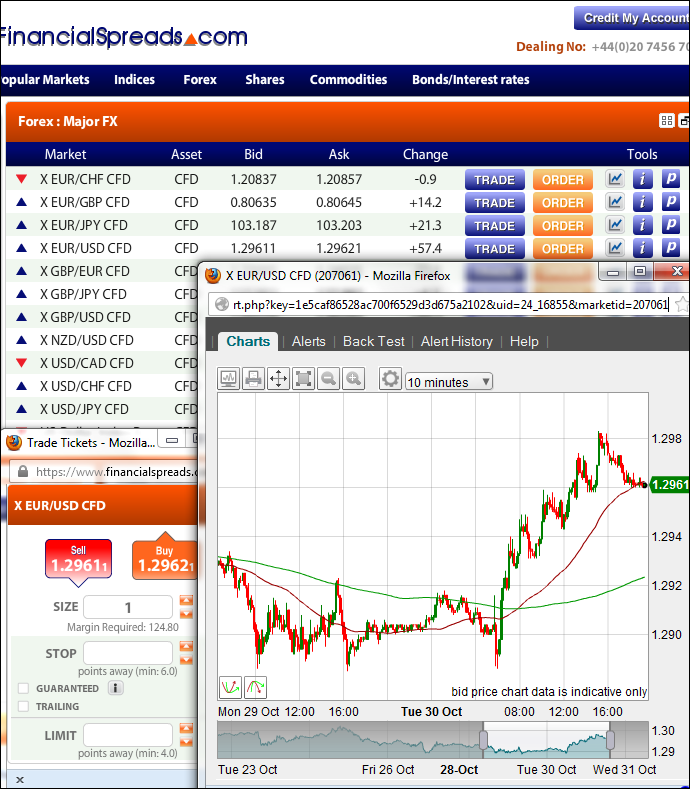
- CFD Prices
- CFD Brokers
- CFD Charts
- Advanced CFD Charts
- About CFDs » Risks » Margin Trading » Trading Costs
- Advantages of Trading with CFDs
- Digital Currency CFD Markets
- CFD Tracker
- CFD Trading Tips
CFD Prices
CFD Brokers
 |
 |
 |
 |
|
| User Ratings | 7.6 | 6.6 | 6.7 | 7.1 |
| Web Platform |
 |
 |
 |
 |
| Mobile App(s) |
 |
 |
 |
 |
| iPad App |
 |
 |
 |
 |
| 24 Hour Trading |
 |
 |
 |
 |
| Live Charts |
 |
 |
 |
 |
| Stop Loss Available |
 |
 |
 |
 |
| Automatic Stop Loss |
 |
 |
 |
 |
| FCA Authorised and Regulated |
 |
 |
 |
 |
CFD Charts
You can use the contracts for difference charts below to access charts for a wide range of markets.Please note that the above chart is typically based on the near-term futures markets. A number of other brokers like IG, Financial Spreads, City Index, Inter Trader and Tradefair will also provide shorter-term markets.
Advanced CFD Charts
Whilst the charts tend to vary from broker to broker, most charting packages come with useful features and tools like:- Many different time periods – 1 minute, 5 minute, 30 minute, 1 hour, 2 hour, 1 day etc.
- Overlays and technical indicators – MACD, Relative Strength Index etc.
- Drawing options and tools – Trendlines, Fibonacci Time Zones, Fans and Arcs
- A variety of views – candlestick charts and bar charts

A Typical CFD Chart
CFD Risk Warning
Only speculate with money you can afford to lose. CFDs are a leveraged investment product and they carry a high level of risk to your capital. Losses can exceed your initial deposit.Make sure CFD trading matches your trading objectives as it might not be appropriate for all classes of investor. Before trading, please ensure you fully appreciate the risks and where you feel it is required, seek independent advice.
About CFDs
Contracts for Difference (CFDs) offer you many of the benefits of trading shares without having to physically own any shares.Simply put, it is a contract that mirrors the performance of a share, index or other underlying market.
While the growth in the popularity of CFD trading has attracted various types of investor and trader, most of those who trade CFDs have had several years of experience in trading equities, options and other instruments.
Some traders use CFDs to hedge their equity portfolio, whilst others use it for directional trading.
For a slightly different view of CFDs, IG have created this brief 2 minute video guide:
CFDs and Margin Trading
Margin trading is another way of saying leveraged trading. Margin allows you to free up your capital.When using margin, you only need to deposit a small percentage of the value of your trade in order to open a position.
Profit and loss is credited and debited to your margin deposit as the market moves. Margins are typically 5-10% for share CFDs and 1% for stock market indices.
Just like physical shares, your profit or loss is determined by the difference between the price you buy at and the price you sell at. However, the leverage with CFDs means that any profits or losses are magnified. Also see CFD risk warning.
Rolling CFDs
Some firms like Financial Spreads and City Index, offer CFDs with an open-ended contract. So, if you have not closed your trade by the end of the day, then the position is rolled into the next day. Note that you will often incur a small financing fee for rolling your trade into the next day. Also see Rolling CFDs and spread bets.Trading Costs and CFDs
The CFD providers listed above do not charge any commissions. Having said that, there can be other charges e.g. Plus500 charge $10 if your account is inactive for 3 months.Also, as mentioned above, if you roll a position from one trading day to the next then you will often be charged a small overnight financing fee.
Advantages of Trading with CFDs

- Range of Global Markets – CFD trading gives investors access to a broad array of markets such as the leading foreign exchange, stock market indices, commodities and equities markets.
- Commission Free Trading – Some firms do charge commissions but a number of the larger firms do not charge any commissions e.g. Capital Spreads, ETX, Financial Spreads, IG, InterTrader and Tradefair
- Trading Flexibility – If a particular market goes against you, then you can close a trade in order to limit your losses. Likewise, if your position is in profit, you can close the trade to lock in your profit.
- Two Way Trading – CFD brokers let you speculate in both directions, so you’re able to speculate on markets to go up or down. If you think that a particular share will fall, you can speculate on it to go down. If you think that a stock market index will rise, then you can speculate on that too.
- Tax Benefits – CFDs can be tax efficient, they are exempt from income tax and Stamp Duty*.
- Speed – An important feature in fast moving, unpredictable markets is that you can trade swiftly. You are not really buying or selling any assets, you are simply speculating on the future value of an underlying market. This makes trading a lot faster and the vast majority of online orders are accepted within less than 1 second.
- Consumer Protection – Make sure the brokers you are trading with are authorised and regulated by the Financial Conduct Authority (FCA), this normally ensures a certain level of consumer protection. Note that the brokers listed above are all authorised and regulated by the FCA.
Digital Currency CFD Markets
2013 saw some new and interesting CFD markets based on digital currencies like Bitcoin and its little brother, Litecoin.For more background information, market updates, real-time charts and prices, please see our guides:
CFD Tracker Account
[London, 27-Jul-11] CMC Markets have launched a new ‘Tracker’ account. The tracker brings together the benefits and features of a CFD trading account with those of a traditional share trading account.The CFD Tracker is a cash-settled-investment in products which are based on indices, currencies, companies and commodities. As the name suggests, the new Tracker tracks the price movement of a chosen product(s).
CFD Tracker: Customisable Leverage
The CMC Markets Tracker is unique in that it offers customisable financing. This means that CMC clients can choose exactly how much financing they want to use for each position, they can choose anything from 0% to 99%.The result is that clients can control their borrowing costs as well as their risk levels.
The 0% financing option will attract long-term investors that traditionally buy stocks and shares through a stockbroker. Clients can now hold onto positions long-term with no leverage. Likewise, they can still trade in the short term with high leverage.
The leverage does of course magnify both profits and losses.
CFD Tracker – Trade a Fraction of a Share
Another feature is the fractional ownership, this lets clients allocate their funds more effectively.Clients can place a trade to match the amount they are prepared to risk. This can be as little as 1/1000th of a unit, or for a specific monetary amount. With a typical stockbroker the minimum investment is 1 share, with the Tracker it can be the equivalent of 1/1000th of a share.
Further features of the new Tracker include:
- A portfolio mixer, with which clients can drag and drop products into a customisable portfolio in any combination. This lets you monitor and compare the price performance of multiple products from a single chart
- Detailed factsheets on products. The factsheets include spreads, margin rates, trading hours, real-time news and insight into how other market forces can influence prices
- CMC Chartswith more than 70 technical indicators
- Live CFD prices and real-time news for 1000s of global products
- Trading directly through the charts. Clients can also adjust orders such as stops, trailing stops and take profit orders
CFD Trading Tips
Why trade Contracts for Difference? As discussed above, CFDs offer tax advantages as well as fast and simple access to the global markets. However, as with all investment products, they come with risks.Most traders have their own rules to help steer their investment choices. Here are a few of the more widespread tips.
- It’s important to have a trading strategy. Considering which of the market areas you are speculating on, setting achievable goals and realising just how much of your funds you’re willing to risk can help you make more informed choices.
- Try to trade the markets and sectors that you understand. If you have little experience of the commodities markets but have a strong appreciation of UK stocks and shares, then naturally you ought to be better off sticking with the UK markets.
- It’s usually worth trying out a CFDs practice account. These practice / demo accounts take less than one minute to set up and, because they use virtual capital, they are risk free.
If you want to test out your ideas on certain markets, then some practice may help you recognise the risks/rewards, the market volatility, the numerous types of trading orders etc. The following firms offer free demo accounts:
Comparison Notes.



Demo Account 



- Avoid trading too many positions at any one time. Making well informed choices on a large number of concurrent positions can be problematic. Likewise, too many trades can make it difficult to judge your overall position.
- As part of your trading strategy, it is best to bear in mind the amount of money that you’re willing to risk on each trade. Attaching a Guaranteed Stop Loss to your positions will guarantee that a losing trade is closed down in the event that it hits the level you stipulated for the order. This helps you keep within the risk limits that you set.
- Acknowledge that you will not make a profit on every trade. Whenever you lose money on a trade, you can be tempted to chase your loss and that will often lead to you making some poorly thought out trades as you try to recoup your capital. These new trades are more likely to lead to a further loss of funds.
More Trading Tips
- For a more in-depth set of tips and strategies see Trading Tips.
- For our daily broker upgrade/downgrade report see Broker Tips.
Spread betting and CFD trading carry a high level of risk to your capital and you may lose more than your initial investment. Spread betting and CFD trading may not be suitable for all investors. Only speculate with money that you can afford to lose. Please ensure you fully understand the risks involved and seek independent financial advice where necessary.
